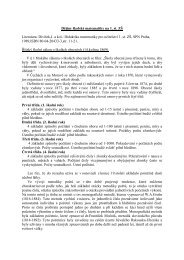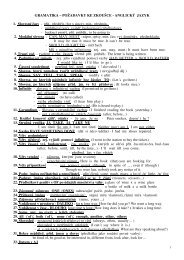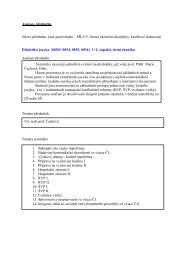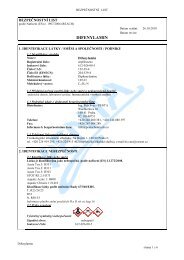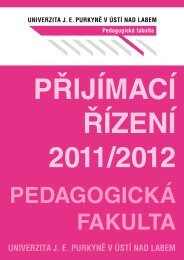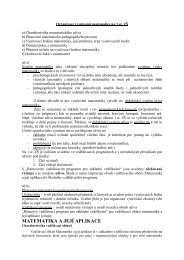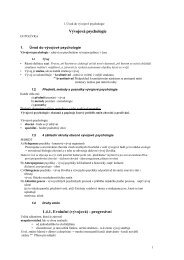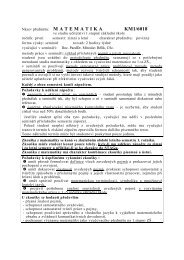reading comprehension text sheet version 2007a - Pf UJEP
reading comprehension text sheet version 2007a - Pf UJEP
reading comprehension text sheet version 2007a - Pf UJEP
- No tags were found...
Create successful ePaper yourself
Turn your PDF publications into a flip-book with our unique Google optimized e-Paper software.
READING COMPREHENSION<br />
TEXT SHEET VERSION 2007A<br />
The interview<br />
“We would like to interview you ...“ . Joyful words for the job-seeker, but my letter carried<br />
a warning: ´You will be required to take a psychometric test.´ More than 70 per cent of<br />
companies now use these ´objective´ tests for potential employees. They are meant to give a<br />
true picture of candidates that removes the unfairness that may result from the personal<br />
opinions of interviewers.<br />
On the day of my interview for the job of assistant to a company Public Relations<br />
consultant, my nerves were made worse by finding that the office was close to a hospital with<br />
particularly unhappy associations. Luckily, I had deliberately got there early so that I was able<br />
to calm myself down before a secretary rushed me upstairs for my test.<br />
Keeping to a strict time limit, I had to assess groups of adjectives, marking which most and<br />
which least matched my ideas of myself at work. Choosing one quality out of four when all<br />
seemed appropriate was difficult, more difficult than the interview that followed – though I<br />
felt I hadn´t impressed in that either.<br />
Confirmation of this arrived a week later. My rejection letter was accompanied by a copy<br />
of the Private and Confidential Personal Profile Analysis – two and a half sides of paper,<br />
based on that 10-minute test.<br />
The Profile’s rude inaccuracy and its judgemental tone were harder to accept than the fact<br />
that I had been turned down for the job. Apparently, I have ´no eye for detail´; I am also ´a<br />
forceful individual ... who leads rather than directs´ and am ´motivated by financial reward to<br />
pay for good living´. The words ´impatient´, ´restless´ and ´strong-willed´ also came up.<br />
´A portrait of an ambitious, power-mad person´, said a psychologist friend of 15 years to<br />
whom I showed the Profile. She said it didn´t apply to me at all. I know myself to be a careful,<br />
industrious checker. I am shy but cheerful and a bit over-anxious to be thought creative. I am<br />
not a power-crazed person.<br />
What would I do, I worried, if I had to take another test for another job, and this<br />
unattractive personality emerged again<br />
I sent the company a polite disagreement with the Profile, purely for the record.<br />
Meanwhile, I made a few enquiries.<br />
Had my emotional state of mind made the results untypical of me I had been disturbed to<br />
find the office so close to a hospital that held unhappy memories for me.<br />
´State of mind will have an impact´, said Shane Pressey, an occupational psychologist, ´but<br />
on the whole its effect will be relatively minor. It appears that the test was an inadequate tool<br />
for the amount of information they were trying to get out of it, and it is not surprising that<br />
there were inaccuracies.´<br />
Too late for that particular job, I arranged to sit another psychometric test. This one took<br />
much longer and was more thorough; the profile was also more detailed and accurate – it<br />
showed my eye for detail and the fact that I have a problem meeting deadlines.<br />
But a peculiar result is hard to challenge without seeming unable to take criticism. It is<br />
simply not acceptable to refuse to take a test, in case the job candidate seems uncooperative<br />
and eccentric. The interview, with its yes/no personal feeling, is here to stay, but so is<br />
objective testing.<br />
If my experience is anything to go by, the job candidate should be suspicious of 10-minute<br />
tests that result in generalised – and possibly wildly inaccurate judgements. I accept that it<br />
would be costly to arrange for face-to-face discussions of test results with all job candidates,
ut a telephone call would be preferable to simply receiving a written ´profile´ through the<br />
post and having no opportunity to discuss its contents.
READING COMPREHENSION<br />
QUESTION SHEET VERSION 2007A<br />
1. Before the writer took the test, she<br />
A felt that she was unlikely to do it very well.<br />
B made sure that she was mentally prepared for it.<br />
C believed that such tests were fair to candidates.<br />
D did some research into tests of that kind.<br />
2. Of the qualities the writer was asked to match with her personality<br />
A some seemed more suitable than others.<br />
B all seemed equally suitable.<br />
C none seemed really suitable.<br />
D the writer was not able to decide which were suitable.<br />
3. What did the writer think when she took the test<br />
A She could not understand some of the questions.<br />
B She found that there was not enough time to do it.<br />
C She felt that she had not done it very well.<br />
D She decided that it would not prove anything.<br />
4. What does the writer mean by ´judgemental´ in the fifth paragraph<br />
A critical<br />
B impatient<br />
C impersonal<br />
D thoughtful<br />
5. When the writer received the Personal Profile Analysis, she<br />
A was offended by the comments made about her answers.<br />
B was glad that she had not been offered the job.<br />
C regretted some of the answers she had given in the test.<br />
D realized that her personality would not have suited the job.<br />
6. Why did the Profile worry her<br />
A It made her feel that she had been too self-confident before.<br />
B It indicated that she might have trouble getting a job in future.<br />
C It did not show that she was capable of being a creative person.<br />
D It told her things about herself that she had not noticed before.<br />
7. According to the occupational psychologist,<br />
A state of mind has no influence on the result of a psychometric test.<br />
B state of mind has a significant influence on the result of a psychometric test.<br />
C the influence of state of mind is not significant.<br />
D the influence of state of mind is decisive.<br />
8. What did she find out after taking the test for the job
A The way she was feeling had badly affected her performance in it.<br />
B Psychometric tests seldom provide reliable information about people.<br />
C Many job candidates are unwilling to take psychometric tests.<br />
D It may have been an unsuitable test for its intended prupose.<br />
READING COMPREHENSION<br />
QUESTION SHEET VERSION 2007A<br />
9. What does the writer recommend<br />
A Candidates should be able to talk about their test results with employers.<br />
B Employers should pay no attention to the results of psychometric tests.<br />
C Candidates should not be concerned about taking psychometric tests.<br />
D Employers should stop asking candidates to take psychometric tests.<br />
10. Why does the writer describe her experience<br />
A It is typical of experiences that a great many other people have.<br />
B It shows that no method of selecting job candidates can ever be fair.<br />
C It is an example of how difficult it can be for someone to get a job.<br />
D It illustrates faults in a new method of assessing job candidates.




